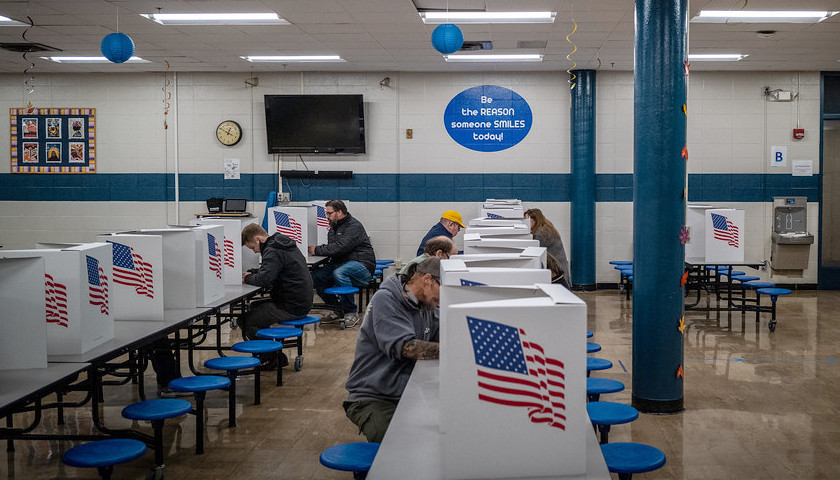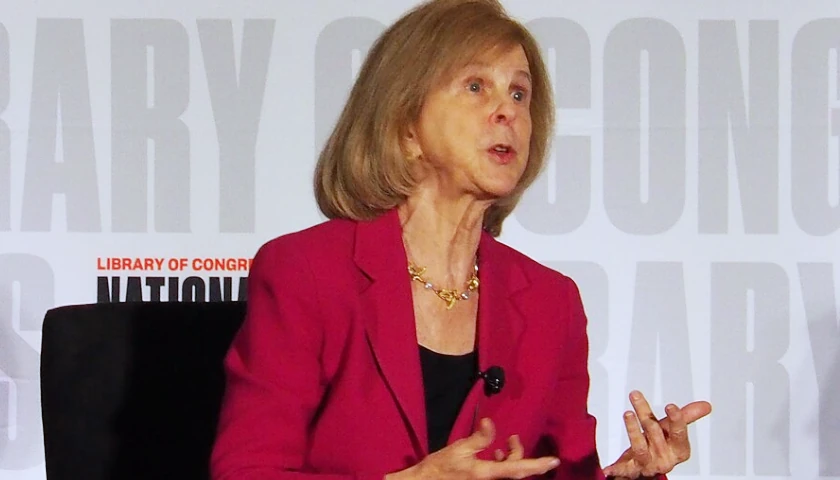by Edward Ring
We live in tumultuous and often troubling times, but that does not make them unique. The ordeals and challenges we face are as old as our species: war, famine, disease, poverty, hate, mass psychosis, greed, brutality, tyranny. Nature is often cruel, and the human capacity to inflict harm on other humans is bottomless.
What is perhaps unique about today, however, is the pace of change and the global scale of its impact. In less than a generation, a communications and information revolution has transformed the lives of 8 billion people. We now stand on the threshold of conquering disease, eliminating poverty, exploiting the resources of outer space, extending our lifespans, and all the while, everyone on earth is witnessing this progress and wanting their share.
This is the truly novel and mostly hopeful context of the age in which we live. But as incredible new wealth and new ways to wield power are created and growing in exponential increments, like moths to a flame, ambitious souls are trying to grab as much of that wealth and power they can. Some hope this competition will naturally evolve for the greater good of everyone. Others, true to the darker side of human nature, just want to use it for themselves.
How do we face the challenges of our time? How do we do good? How do we cope with evil? What do we do with the time that is given us? What can individual Americans do?
First we must recognize that if American society is losing its traditions and splintering into polarized factions, it isn’t all happening by accident. If chaos alone governed our destiny, why is it that every institution we used to trust, in lockstep, is promoting so many obvious lies? No objective and informed person can fail to at least question, if not completely reject, premises these institutions relentlessly promote:
Human civilization is unsustainable. We are running out of fossil fuel. Burning fossil fuel will destroy the planet. Renewable energy is clean. Renewable energy is the only acceptable option. White people are inherently racist and enjoy unwarranted privileges. Mathematics are racist. The nuclear family is oppressive. People can choose their genders. Men can have babies, and women can have penises.
Each of these premises is not only false, but, if accepted, will wreak destruction on America and the world.
Yet these foundational lies inform every manner of mainstream public communications, from news, entertainment, education, and public policy debate, to social media discourse and search engine results. The truths that must replace these lies, in similar fashion, constitute the foundation of a resistance:
Humanity can flourish. Fossil fuel does not create an existential threat to the planet, and there’s plenty of it. Renewable energy is not cleaner or more sustainable than fossil fuel or nuclear power. White people are not inherently racist. Providing equal opportunity to earn success in a colorblind society is the only equitable way to allocate privileges. Math is not racist. The nuclear family with a father and a mother is the optimal way to raise children to become healthy, happy and productive adults. Sex is immutable. Women have babies, and men have penises.
Is that clear enough?
Asserting these truths has a virtue that the other side, for all its power, cannot match: They’re true. They’re backed up by data, experience, science, and common sense. That’s why despite odds that often seem hopeless, it is still possible to rally the American people and politically realign the nation. There’s a gravity to truth. It flows downhill like a river. Lies, on the other hand, require continuous effort to uphold. Truth, as it applies to these fundamental premises, also has the virtue of being uplifting and optimistic.
It’s a relief and a breath of fresh air to hear someone explain that we’re not all about to die in a climate cataclysm, that there are plenty of energy resources, that prosperity is an eminently possible choice, that America has created the most inclusive society in the history of the world, and that it’s OK to be white, black, brown, or whatever, it’s OK to be colorblind, and it’s OK to have a traditional family and teach traditional values and norms to your children.
The venues for asserting truth to power are many and the opportunities are poorly exploited. Here are some of the many ways to change your community and change the nation.
How You Can Change the World
Pack public meetings: Leftist activists who show up, without exception, to loudly push their agendas at city council meetings are sending a message: Vote for what we want or we will continue to disrupt everything you do, including every public meeting where you appear and including any attempt you make to get reelected. Packing public meetings also helps a biased media spread the perception that there is grassroots support for a policy, even if there isn’t. Elected officials and appointees to governing boards are reluctant to vote for anything that violates the sentiment of the boisterous crowd packing a meeting. If you don’t show up, you lose.
Litigate: Using lawfare to derail common sense public policies has been used by the establishment Left for decades. Litigation is one of the primary reasons we can’t get the homeless epidemic under control, or build new water projects or oil pipelines, or any other badly needed infrastructure. Litigation has been the synergistic partner to regulatory bureaucracies, where the activists sue the agency, the agency immediately settles, paying the activist law firm a massive penalty fee and layering new regulations onto the American people.
Litigation has been used to compromise American elections, where to eliminate “voter suppression,” countless loopholes have been blown through election integrity up to and including not even having to produce a valid ID in order to vote. Litigation has been used by the Left to expand every well intentioned bit of legislation or regulatory decree from a nuisance into a monster. It’s a racket. Fight fire with fire. Sue.
Participate in grassroots election campaigns: An obscure and very close election, belatedly called on December 1 in deep blue California exemplifies how good candidates can beat the odds. In the seventh assembly district, where registered Democrats outnumbered registered Republicans by six points, political newcomer Josh Hoover overcame a five-term incumbent Democrat despite being outspent four-to-one. His secret? What limited resources his campaign had were spent primarily on mobilizing volunteers to knock on doors, send texts, and make phone calls.
Hoover already had name recognition, because voting households had been saturated with television ads and mailed flyers demonizing him. This meant when voters met the candidate in person, or met his volunteers, they already knew him, and could immediately tell he was a good candidate with good ideas, that he was the underdog, and that his opponent had nothing to offer apart from a dirty campaign.
Get involved in local campaigns: It’s hard for one person to change the outcome of a national election. But the concerted efforts of just a few individuals can make the difference in a race for city council or school board. If you’ve had it with how your city is managing the homeless crisis or how your school board is failing to manage the left-wing agenda of the local teachers’ union, then get involved. If you don’t want to run for local office, help a local candidate. In many of these races, just a few more people walking precincts can change the outcome. It happens all the time. As local victories build up, these winning politicians gain experience to take the good fight to races for higher office. When it comes to local elections, one person can make a difference.
Support ballot initiatives and recalls: On September 14, 2021 Americans witnessed an unusual political event. In solidly Democratic California, of all places, Governor Gavin Newsom had to take time off from pursuing his dream of becoming the 47th U.S. president to fight for his political life. Fueled by a relative pittance in donations but an abundance of passion, a grassroots army, easily a hundred thousand strong, circulated petitions to recall the governor, submitted over 2.1 million signatures, and forced a special election. Newsom and allied committees opposing the recall were forced to spend $92 million to defend his seat.
If a strong enough contender had surfaced, Newsom would have lost. Initiatives and recalls are expressions of direct democracy with decisive power. In an age when petitions can be downloaded from a website, printed at home, signed and returned, the power of local and state ballot initiatives can be exploited far more often and at far less cost than is currently done. Find a cause, and start a committee. You will give them a scare. You will drain their resources. You might win.
Listen to what nonpolitical people want: Most Americans have a vague sense they’re being fed a pack of lies by a government run by special interests, but unless they’re among the minority of Americans who have made politics one of their top priorities in life, they don’t realize the extent of the danger or the depth of the lies. For these Americans, the last thing the Right needs to do is come across as even angrier and more extreme than the leftist machine they oppose. There are issues that animate the hard Left and the hard Right, and it’s an existential battle. But the derivatives of that battle are playing out in the issues that everyone cares about.
It isn’t necessary to explain—truthfully or not—that evil forces are behind the push to replace math instruction with queer theory. It’s more productive to calmly ask “don’t you think it’s better if we prioritize reading, writing and arithmetic in K-12 schools, and keep sex education age appropriate and subject to parental consent?” Similarly, it isn’t necessary to explain—truthfully or not—that the entire “climate change” narrative of doom is a plot by a fascist oligarchy to conquer the world. It’s more productive to simply explain that renewables aren’t ready for prime time, and conventional energy is the only way civilization can thrive.
Find new allies: Probably the most important missing partner in reforming the American establishment and realigning American politics are labor unions. This deserves closer examination. As it is, the prevailing special interests in America are hedge funds, technology corporations, and pharmaceutical companies, in that order, with most of corporate American falling in right behind them. These special interests now completely control the Democratic Party and most of the Republican Party.
Historically, however, labor unions controlled the Democratic Party. What has happened to labor unions in the past 50 years, and especially in this century, is their original charter—to protect the American worker—has been supplanted by a veneer of internationalism, i.e., protect all workers of the world, eliminate racism, and stop climate change, while behind that veneer is a desperate compromise.
Unwilling to submit to the optics of supporting populist Republicans, or to support the anti-establishment substance of America First policies, union leaders in America have joined forces with the neoliberal, globalist uniparty. Open borders and energy poverty are policies they now accept, and an impoverished and disenfranchised American workforce is the consequence. If labor unions were true to their membership, they would return to their roots and demand regulated borders and deregulated energy and infrastructure development. Don’t give up on labor unions.
Boycott woke corporations: There are several lists of so-called woke companies that pander to the activist Left. While high profile examples include Disney and the NBA, it is important to also look for the companies that express their wokeness in ways that directly harm the economy. For example, the environmental, social, and governance (ESG) criteria being used by the Left to judge companies is designed to eviscerate America’s energy economy.
Choose your targets carefully, and attend to the big picture: The most influential woke institutions in the world are arguably Blackrock and Vanguard. Pick companies to boycott where there a movement has formed in order to leverage your impact. Consider investments in the growing non-ESG movement such as being pioneered by Vivek Ramaswamy’s new firm Strive. Never forget that as more Americans rebel, these boycotts will gather irresistible strength.
Become a prepper: This advice is offered in the broadest possible sense. Being a prepper doesn’t necessarily mean you have to hunker down in remote hills on a fortified compound. It can just mean you have prepared for possible hard times by stocking food, fuel and a means to defend your home at the very least against nongovernmental disorder, i.e., against mobs of rioters and looters. Knowing you and your family are prepared for difficult times makes it easier to participate in public activism, because you know you’ve already done everything you can in your private life.
Engage in peaceful protests: When the people who control the pumps that deliver water through aqueducts to farms and cities in Southern California are driving to work, on yet another day when those pumps are turned off so an endangered bait fish can survive, a fish that is being wiped out by non-native, introduced predator species more than by the pumps anyway, why aren’t ten thousand angry people lining the road outside the gates? Environmentalist extremists, along with social justice warriors, have engineered demonstrations to stop everything from pipelines in the Dakotas to desalination plants off the California Coast, so why aren’t the people whose lives and livelihoods are being destroyed by these policies also showing up and applying pressure? Organizing has never been easier. Do it.
Be a social media warrior: This is the easiest form of getting involved. It’s been justifiably satirized: the “activist,” sprawled on his couch with a bong and a laptop, poking keys and pretending he’s making a difference. But it’s naïve to think fighting online battles doesn’t matter, and misleading to think it’s easy to do this effectively. If tens of millions of people share news, promote values, and expose misdeeds online, the truth cannot be suppressed.
If tens of millions of people engage in activity reciprocal to how organized online mobs of left-wing activists behave, reporting every misleading message, vilifying every villain, exposing every decision maker that currently hides in bureaucratic anonymity, it will make a difference. If you can’t do anything else, learn everything you can about social media, set smart priorities to maximize your time, and get to work.
The tactics described here are only some of the ways to help keep America great. There are plenty of reasons to be hopeful about where America and the world is headed. And this optimism is yet another source of power. Optimism energizes activists and it attracts new recruits. Matching an optimistic attitude with proven tactics becomes a force very difficult to stop. Political realignment is possible in America. Every one of us can help make it happen.
– – –
Edward Ring is a senior fellow of the Center for American Greatness. He is also is a contributing editor and senior fellow with the California Policy Center, which he co-founded in 2013 and served as its first president. Ring is the author of Fixing California: Abundance, Pragmatism, Optimism (2021) and The Abundance Choice: Our Fight for More Water in California (2022).
Photo “People Voting” by Phil Roeder. CC BY 2.0.





